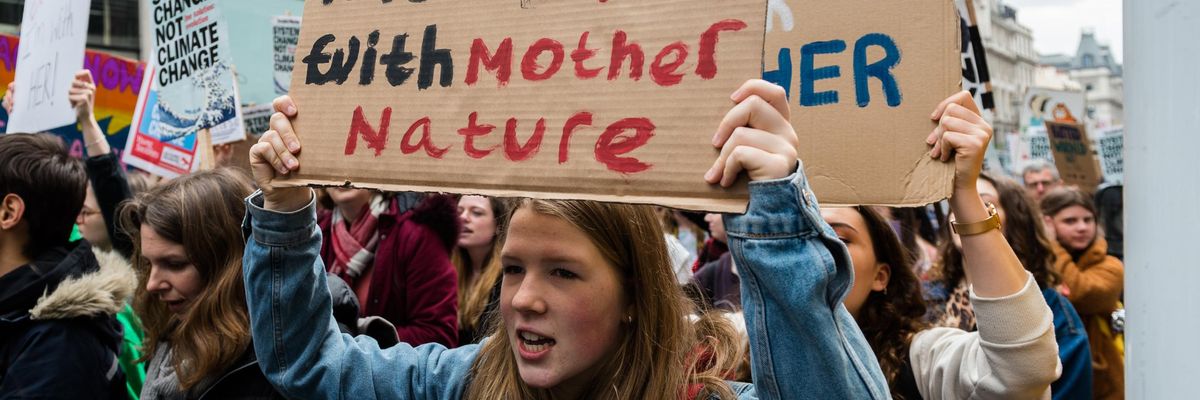Hundreds of global groups on Thursday urged Ireland to introduce a United Nations resolution for a ban on hydraulic fracturing, arguing that the country is particularly well-positioned for the move, given its previous efforts to outlaw fracking and divest from fossil fuels.
"We, the undersigned, support a call for a global ban on fracking being proposed by Ireland at the United Nations General Assembly on climate-mitigation, public-health, environmental-protection, and human-rights grounds," says a statement now signed by more than 700 organizations, including over 100 from Ireland, and two dozen individuals.
As a press release about the call for a resolution explained:
Once the resolution is introduced to the U.N. General Assembly, it would need a simple majority vote to pass. The coalition believes there will be support for the resolution given the large number of U.N. member states that are highly vulnerable to climate change and sea level rise, as well as recent calls by the U.N. to address climate change and implement the Sustainable Development Goals, the spirit of which runs contrary to fracking. A U.N. resolution in favor of a global ban on fracking would set a high bar for ambitious existential results at the COP26 in Glasgow.
The new call echoes an April letter (pdf) that Irish activists, groups, and legal experts sent to key government leaders.
"We are asking you to urgently direct the Department of Foreign Affairs to initiate the process which would see Ireland, as a Global North country, jointly introduce and lead co-sponsorship of this proposed resolution with another Global South U.N. member state partner," the letter says, noting a confirmed commitment from the Maldives.
"Ireland's tireless efforts to ban fracking and stop the importation of fracked gas from other countries," the letter adds, "was done in recognition of the very principles which underpin the draft resolution; that is, that fracking is an inherently harmful extraction process that has global impacts no matter where it is conducted and that no amount of regulation can adequately address all the problems that flow from fracked drilling operations and our continued reliance on fossil fuels."
Signatories of Thursday's call reiterated the letter's warning about the dangers of hydraulic fracturing, a process that involves injecting water, sand, and secret chemicals into a rock formation to extract oil or gas.
"Negative health effects from fracking--complications of pregnancy and poor birth outcomes, damage to the heart and lungs, mental health impacts, cancer--will all be reduced as a result of a global fracking ban," said Sandra Steingraber, an initiator of the new call for a resolution.
Co-founder of Concerned Health Professionals of New York and senior scientist at the Science and Environmental Health Network, Steingraber also co-authored the most recent edition of The Compendium of Scientific, Medical, and Media Findings Demonstrating Risks and Harms of Fracking.
Fellow initiator Dr. Edward Ketyer, a pediatrician and president-elect of Physicians for Social Responsibility Pennsylvania, said that "a global ban on fracking will improve public health and safety everywhere, not just in communities that have been damaged and scarred by unconventional oil and gas operations."
Other initiators of the call for a resolution include Sister Majella McCarron OLA; Michele Fetting of the Breathe Project; Andy Gheorghiu of Climate Protection and Energy Policy; New York-based environmental attorney Scott Edwards; Mexican environmental justice activist Claudia Campero; Lois Bower-Bjornson, a Pennsylvania resident impacted by fracking; and Eddie Mitchell of Love Leitrim.
A statement announcing the call highlighted that in addition to other concerns about fracking, researchers from the Irish Center for Human Rights at the National University of Ireland Galway School of Law have also found the practice "to be incompatible with human rights."
"The process of fracking involves widespread human rights violations, a point repeatedly highlighted by U.N. legal experts," said Maeve O'Rourke, director of the center's Human Rights Law Clinic, which was a signatory to the April letter.
"Ireland made the right decision to ban fracking in 2017," O'Rourke said, "and now we have the opportunity to lead the world in ensuring that all communities and our global ecosystem are protected from this toxic and dangerous process."
High-profile supporters of climate action and environmental justice have also signed on to the resolution demand, including 350.org co-founder Bill McKibben, magician Keith Barry, and actors Jane Fonda and Mark Ruffalo.
The third paragraph of this piece has been updated.

